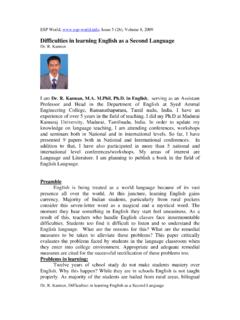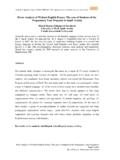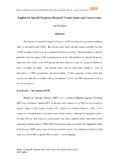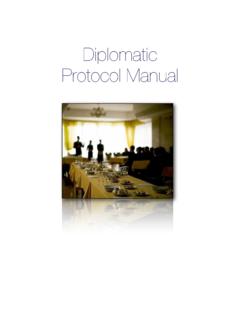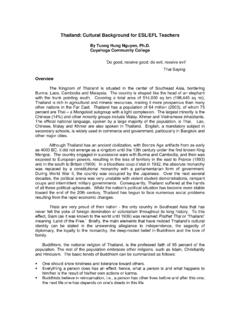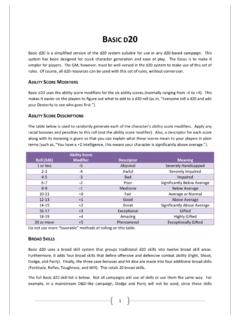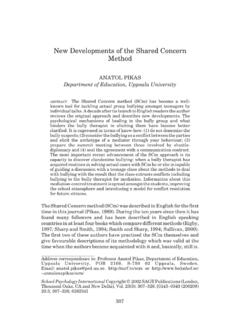Transcription of WRITING FOR ACADEMIC PURPOSES: PROBLEMS FACED …
1 ESP World, Issue 2 (28), Volume 9, 2010, WRITING FOR ACADEMIC PURPOSES: PROBLEMS FACED . BY ARAB POSTGRADUATE STUDENTS OF THE COLLEGE OF. BUSINESS, UUM. Fadi Maher Saleh Al-Khasawneh ABSTRACT. This study aimed at investigating the ACADEMIC WRITING PROBLEMS of the Arab postgraduate students of the College of Business at Universiti Utara Malaysia and to provide solutions to these PROBLEMS . For this purpose , four research questions were posed and the answers to these questions were provided and discussed. The data for the study were collected via (face-to-face) interviews. The informants of this study were postgraduate students from the College of Business at Universiti Utara Malaysia for the ACADEMIC year 2008-2009.
2 The findings of the study revealed that the students FACED PROBLEMS in relation to vocabulary register, organization of ideas, grammar, spelling, and referencing. Introduction Nowadays, English plays an important role in education and students are expected to communicate effectively in institutions where English is the medium of instruction. Learners face the task of mastering content area in subjects such as mathematics, social studies, science, and business which are taught in the target language (English). In such cases, teaching and learning of English can help the students to deal successfully with their ACADEMIC demands and to perform successfully in their disciplines and professional contexts (Adams & Keene, 2000).
3 WRITING FOR ACADEMIC PURPOSES: PROBLEMS FACED 1. BY ARAB POSTGRADUATE STUDENTS OF THE COLLEGE OF BUSINESS, UUM. Fadi Maher Saleh Al-Khasawneh ESP World, Issue 2 (28), Volume 9, 2010, In the ACADEMIC context, Dudley-Evans & St. John (1998) point out that the students are required to produce specific WRITING genres such as essay, summary, critical review, and research paper. However, focus on the distinguishing regularities of structure of different text types can help learners build a repertoire of the organization and the relevant language forms of different genres. It can also make learners aware of the socio-linguistic role that texts play in particular discourse communities.
4 In postgraduate studies in Malaysia, as pointed out by Baskaran (1983), English plays a vital role in helping to initiate students into the ACADEMIC community in acquiring not only the language proficiency necessary but the specific genres pertaining to these communities. Like any second language learners, Arab learners face many PROBLEMS in acquiring English. Many studies (Abbad, 1988; Hisham, 2008; Rabab`ah, 2003; Zughoul and Taminian, 1984) have been conducted in the Arab world to investigate the PROBLEMS of acquiring English among Arab learners. Zughoul and Taminian (1984: 4) found that Jordanian EFL students commit serious lexical errors while communicating in English.
5 Rabab`ah (2003) emphasized that there were PROBLEMS of acquiring English among Arab learners because of formal instruction by language teachers who are native speakers of Arabic. Another reason given by Rabab`ah (2003) was the limited opportunities Arab learners have to learn English through natural interaction in English since they only encounter native speakers of English who come to the Arab world as tourists. Hisham (2008) investigated the PROBLEMS that Arab students of business might have at University WRITING FOR ACADEMIC PURPOSES: PROBLEMS FACED 2. BY ARAB POSTGRADUATE STUDENTS OF THE COLLEGE OF BUSINESS, UUM.
6 Fadi Maher Saleh Al-Khasawneh ESP World, Issue 2 (28), Volume 9, 2010, Utara Malaysia. He found that those students face PROBLEMS in vocabulary register, grammar, and referencing. Abbad (1988: 15) admits the weakness of Yemeni learners of English, and he states that in spite of the low proficiency level in English of most applicants (Yemeni learners), they are accepted into the English department. In most of the Arab universities, high school graduates are still accepted to pursue a program, such as English Studies, in spite of their weaknesses in that language. Arab learners find it difficult to communicate freely in English.
7 Abbad (1988) mentions that their PROBLEMS are due to the inappropriate methods of language teaching and the learning environment which some judge are unsuitable for learning a foreign language. The students appeared to have many PROBLEMS when WRITING in English, like not knowing how to organize their ideas, because it is a new experience for them. For students to succeed in a foreign language generally, and WRITING skills specifically, they need to surround themselves in a language learning environment. In the case of the Arab world, Arab learners have little opportunities to use the foreign language in their society.
8 As a result, many PROBLEMS occur when they study at a university where the medium of instruction is a foreign language like English. Literature Review English for Specific Purposes (ESP) is divided into English for Occupational Purposes (EOP) and English for ACADEMIC Purposes (EAP). It aims to prepare students, in a relatively short period of time, to communicate, read, and write better so they can work WRITING FOR ACADEMIC PURPOSES: PROBLEMS FACED 3. BY ARAB POSTGRADUATE STUDENTS OF THE COLLEGE OF BUSINESS, UUM. Fadi Maher Saleh Al-Khasawneh ESP World, Issue 2 (28), Volume 9, 2010, appropriately and successfully in certain activities.
9 In order to achieve this goal, ESP. activities have to be presented in context because context is the central idea of ESP. The other point that has to be taken into consideration in teaching ESP is to use authentic materials; this will lead the students to acquire what they need to develop for their jobs (Hutchinson & Waters 1987). According to Dudley-Evans (2001), the absolute characteristics of ESP are: ESP is designed to meet the specific needs of the learners. ESP makes use of the underlying methodology and activities of the specialization it serves. It is centered not only on the language (grammar, lexis, register), but also on the skills, discourses and genres appropriate to those activities.
10 English for Occupational Purposes (EOP). EOP can be grouped into business English, professional English ( English for doctors, lawyers) and vocational English ( English for tourism, aviation, and nursing). Several studies (Flanegin and Rudd, 2000; Goffman, 1979; Pakir, 1999, Puvenesvary, 2003) have been conducted on the importance of English in the occupational fields. Flanegin and Rudd (2000) discuss the need and importance of English skills in all professions. In addition, they emphasize on the importance of communication skills in the business and management fields by suggesting some solutions to enable students to be good communicators in business majors.
